BREXIT - THE NEW BORDER
BREXIT; A NEW BORDER
The wake of World War 2 left most of Europe in economic ruins. The population was struggling to survive, with economic depression, and mass unemployment rampant.
In 1957, a handful of countries consisting of Luxembourg, France, West Germany, Belgium, Netherlands and Italy, banded together, to form the very first European Community. This was done to establish a common European market, set-up a European social fund, to improve people's living standards after the war, and allow free movement of workers in Europe. It was believed that if countries worked together and with each other, there was less chance of them fighting each other.
Gradually, more countries became a part of the EC, and became what is now the European Union.
However the recent wars and conflict of Syria, Libya and neighbouring countries, resulted in the 2015 European Refugee Crises. This saw thousands leaving their home countries and economies, which were being ravaged by war.
TAXING THE BITCOIN
TAXING THE BITCOIN
The financial crash of 2008 left many see their savings, pension funds and investments reduce to very little in a matter of days. In the eyes of many, the institutions who were responsible for regulating and monitoring fiscal conduct, including the banks and government, had lost their credibility in the eyes of many.
The time was ripe for a new non-governmental, non-centrally controlled currency. One that wasn't monitored or controlled by a centralised banking system. One which's value wasn't affected by a fluctuating interest-rates and inflation. But affected by more pure economics of supply-and-demand.
KLARMANS BUDGET REVIEW 2017/18
The Annual budget practically affects every single tax-payer and business operating in England and Wales. However a lot small businesses and business-owners are not as privy to what the Budget means, and how it may affect them.
So in this review, I will be outlining the main points of the Budget that affects individual tax-payers and small-business owners the most. Ranging from the self-employed to small company owners.
WHEN INNOVATION HITS A WALL
WHEN INNOVATION HITS A WALL
The theory of disruptive-innovation states that for a new application (or "app") to be truly successful, it has to start or sink its routes right at the bottom of the market. It then should be gradual yet relentless in moving up-market, disrupting and replacing the established players in the territories they occupy.
Nothing in modern times could better exemplify this path than the US ride-hailing app company Uber.

BREXIT - THE AFTERMATH
_____________________________________________________________________________________________________________________________
BREXIT - AFTERMATH
Pioneered and adopted by the UK in 1993 by Margaret Thatcher’s government, the Single European Market was considered a “significant British achievement”, and a huge step to boost the British economy.
It allowed for free movement of all types of resources; goods, services, capital and people, within the 28 EU countries.
With no internal borders, and other regulatory obstacles, the Single European Market eliminated unnecessary tariffs, and trade barriers.
STAMPY DUTY & THE HOUSING BOTTLENECK
STAMP DUTY & HOUSING
According to recent research by leading property surveyors and developers, the current stamp-duty/land-tax system is causing a huge bottleneck to develop in the UK's current housing market.
Taxing Apples
_____________________________________________________________________________________________________________
TAXING APPLES
Apple, is the most valuable company in the world, exceeding shareholder expectations with each product launch, and out-performing its closest rival Microsoft since 2009.
However the technology giant has come under huge scrutiny by the European Union's European Commission, which has been policing the tax policies of its member states for several years now, over its tax hurdling tactics.
Page 1 of 2


